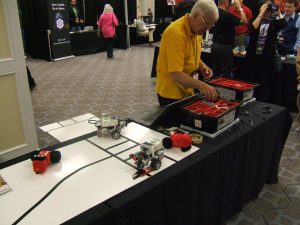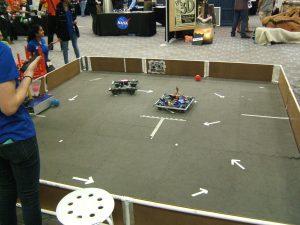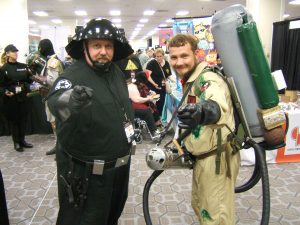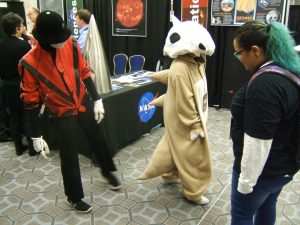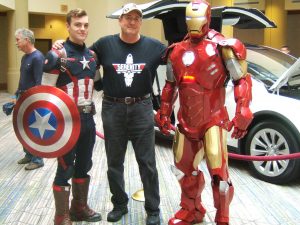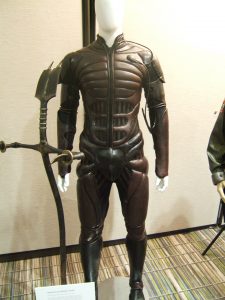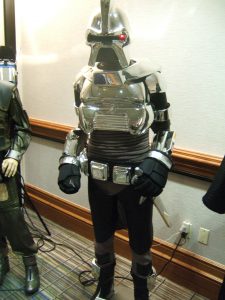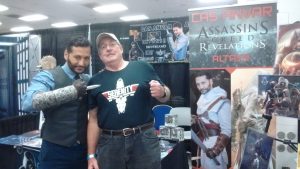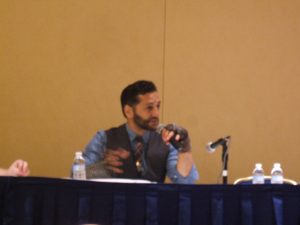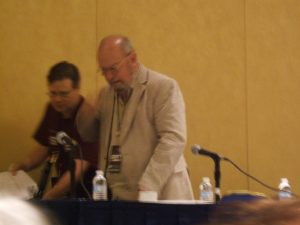At some past con, the lovely and hilarious Jennifer Jayne introduced me to the Museum of Science Fiction, so when MSF put on Escape Velocity 2017 in downtown DC, I decided to take myself down there and see what fusses were being made. This is not your standard con because it’s STEM oriented and had a lot of science stuff for kids. Science stuff, people. For kids.
But there were still enough con elements to attract we geeks:
What universe is this?
I have no idea what this is.
Iron Man and Captain A pitched me for Avengers membership, but my only superpower is bad jeans, so wouldn’t work.
In case you’re planning a visit to the desert:
Security:
While I was floating around, I noticed Cas Anvar manning a booth. I knew who he was from The Expanse (what? You don’t know The Expanse??? Stop reading, go watch Season 1, then resume reading) but there were Assassin’s Creed posters all over his booth and I queried. Some helpful bystander said, “Don’t you know he’s Altair?”
I did not.
So I genuflected before Cas Anvar and pledged my firstborn (Sky, you report on Wednesday) and told him what a fanatic Assassin’s Creed guy I was. Indeed, I had just finished Revelations a few months ago, which got me quite the askance glance and I had to explain that I’m really, really slow. “So, mortal!” Cas’ godlike voice boomed, “Thinkest thou an expert? Answer these questions three!” And he gave me a quiz, promising me treasure and a princess if I won and I blew it. Just. Blew. It. Couldn’t remember anything about the golden discs or the Apple and barely able to answer what Etzio found in the library. And, yes, YES! I DID see Etzio’s movie at the end! He took pity on me and signed an AC poster and then tried to kill me.
A little later on, Anvar had a panel
where he strived mightily to show clips from The Expanse but he was relying on Earth tech and not Martian so it didn’t work quite right. Didn’t matter, entertaining and informative panel, it was. Anvar (who was going to be a chemical engineer before getting the acting bug so no slouch, this guy) spent most of it talking about the science of the series, which he called a character in its own right. The producers are constantly consulting with physicists, astro and otherwise, to ensure effects are correct. Space is trying to kill them in every show, is an obstacle they have to overcome, so it’s gotta be right.
Anvar said he didn’t want to fake his way through the piloting sequences, so he learned the consoles for each kind of ship. When he got the console for the Rocinante, the badass Martian corvette the crew stole, there was no joystick like you see on every other kind of space ship in scifi-dom because the Rocie is too damn fast. In high g’s, your arms weigh forty pounds apiece so how can you whip a joystick about? His controls are actually fingertip pods.
Space battles aren’t punch outs between phasers and lasers, but involve rail guns hurling grapefruit-sized pieces of metal at each other. A grapefruit-sized piece of metal moving at hypersonic speeds turns a ship’s hull into plasma and goes right through, hot knife and butter, and out the other side for eternity. In a couple thousand light years or so, ET could get winged by a stray shot. Shredding the hull causes it to pop like a balloon so all the air has to be pumped out of the ship before a battle begins, which is why everyone suits up.
Cool.
Also cool, Joe Haldeman.
Yes, Joe Haldeman was there, author of The Forever War and maybe a lot of other things but that’s what everybody knows. He was introduced as the guy who invented military science fiction and no, he isn’t; Heinlein is. But this is a quibble because Haldeman introduced the mind bending concept of time differentials; you know, wormholes and distances age a soldier twenty years while the Earth ages 2000, so how do you keep fighting for a society that disappeared centuries ago? It’s like those Japanese soldiers on remote Pacific Islands still fighting WW2.
Haldeman’s wife was sitting in the front row and, several times, had to correct or remind him of events. Got pretty hilarious. Proof that wives remember everything. Every. Thing.
Haldeman got his draft number in the 60’s (young’uns, you’re going to have to Google that) and, like everybody else, panicked and asked the Army what could he do to improve his situation, which is like asking Hannibal Lector for dinner recipes. Why, you can go ahead and join, said the spider. Of course, said the fly, and I would absolutely like to stay away from war if I could, hearing that it’s not very healthy and the Army said sure! We’ll give you two years as a laboratory assistant…[whisper: after we send you to Vietnam for a year].
Things never change.
Haldeman was wounded 27 times in Vietnam, no doubt including those annoying little secondary cuts and scrapes that usually accompany the bigger things like bullet holes and eviscerations. Wound’s a wound, though, and raised glass in your direction, brother. This, of course, gave him a lot to write about, which was good because he’d always wanted to be a writer and the Army gave him the opportunity to visit exotic locales, meet interesting people, and kill them…only you vets will get that. Before going to Vietnam, Haldeman had studied astronomy and physics and the war gave him, as he put it, a “great existential advantage” to put all that into scifi form.
Scifi was his refuge. When he got back from Vietnam in 1969, he missed most of the social changes because he was immersed in the genre, isolating him from all the craziness. His “scifi buddies,” Heinlein in particular, helped him recover from combat.
His first published story was for Galaxy and, by the time he wrote the novel, he was an established scifi short story writer.
The Forever War was the right book at the right time. Most military scifi up to the point was right-wing, pro-government, and very male. His was different. It was based on Vietnam, for one thing, and had women combatants and homosexuality and these things don’t mix so get those women (and gays) out of there! He contacted seventeen publishers, not a one of them giving him the time of day, and was in a fairly foul mood when he attended the Nebula Awards dinner. He “pissed and moaned” to a bunch of his friends that no one wanted his story. Ben Bova had been running chapters of it as a serial called “The Hero” and mused that St. Martin’s Press, not known as a scifi imprint, was interested in Vietnam and might be approachable. They were, by chance, at the dinner, and Haldeman approached them and the rest is history.
The novel’s title came from riffs with his brother as they were driving somewhere. They went through several possible titles, his brother coming up with “The War that Lasts Forever,” and Haldeman responding, “The Forever War.” At that moment, a golden light enveloped the car and angels sang, so he kept it. Judy Lynn at Del Rey didn’t like the title. At all. Or the book. So that’s how he ended up at St. Martin’s.
Haldeman wrote the second Star Trek novel, called Planet of Judgment. It came after Spock Must Die. He also wrote The Forever Peace, which is not a sequel to The Forever War and he took a lot of crap because it wasn’t a sequel so he wrote an actual sequel, Forever Free, to shut everyone up. He writes his drafts in longhand. Haldeman got involved with Damon Knight and the Clarion Writer’s workshop from the beginning. No one back then intended to start a scifi industry; it just worked out that way. While he was at Milford, Disney approached him to write a ride for Epcot. Turned out to be A Journey Through the Solar System.
Despite the military theme of the book, Haldeman considered himself a failed soldier. He never was “into” the Army or the military lifestyle. His generation changed the world and left it a mess. He does not think much of academia’s attempts to turn any kind of genre writing into academic writing (I think he’s referring to scholastic papers about scifi and such). If you paint stripes on a giraffe, it’s not a tiger. Academic writing is just that, academic. And I freely admit to not being fully versed on what he meant here.
Afterwards, I got my copy of The Forever War signed and told him I’d spent twenty years in and that he’d written war from the viewpoint of the typical grunt: as long we’re getting paid, getting laid, and getting promoted, doesn’t really matter what the Army makes us do.
Ain’t it the truth?


